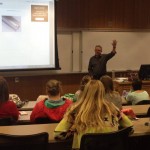Unwrapping science, journalism with Joe Palca
Friday’s “Science Unwrapped” featured National Public Radio Science Correspondent Joe Palca, who chose to speak about “Unwrapping Science on the Radio.”
Palca has been a correspondent for NPR since 1992 and has covered topics ranging from technology to biochemistry to astronomy.
“I talk to scientists, and I try as hard as I can to get people who aren’t scientists… to appreciate, just for a few seconds, the joy and passionate that scientists have when they do their work,” Palca said.
Palca specializes in taking perplexing concepts and condensing them to make them accessible to the average NPR listener.
In a preview released by the College of Science, Palca said, “My talk will explore how you present a complex topic in a short period of time. I will attempt to prove by example that any topic can be explained to at least some degree of abstraction enough for a lay audience to be informed and entertained.”
With about 400 people in attendance, audience members included students, faculty and inquisitive minds from the community. Also in attendance were members of USU’s Old Main Society, some of whom were inducted last week.
The event, which was sponsored by Utah Public Radio, is part of a series of Science Unwrapped presentations, with topics ranging from forestation to air quality.
“It’s a program of the College of Science that’s designed to show anyone who shows up what kind of things the scientists or science-related researchers are doing here at USU,” said Professor of Biology Nancy Huntly of “Science Unwrapped.” “Most of our speakers come from here, but we have some guest speakers and Joe Palca was one of them. And we just try to make science fun and accessible to all of the community.”
25 exhibits were displayed in the Eccles Science Learning Center, and the audience was encouraged to learn about student research after the presentation.
On Thursday, Palca met with five classes, including classes of journalism and graduate students. After giving brief presentations, he gave students the opportunity to ask questions. It was a unique forum for students to learn from an expert.
“Science is sort of mysterious. You think about it as wrapped up in bundles of jargon, or bundles of literature that you can’t really penetrate. So maybe I can just talk about how I peel back the layers of what covers science and try to get into the essence of it,” Palca said.
Through example, Joe Palca gave the audience a general idea of what it’s like for a scientist to make a new discovery.
“There’s a moment where you discovery something and you have an idea based on some data that you got that you just are really excited about – and for that one moment you know something about the nature of the natural world that nobody else knows on the planet. And that is such an incredible feeling.”
Joe Palca is currently working on a series for NPR called “Joe’s Big Idea,” which explores the minds and motivations of scientists and inventors. He focuses largely on how ideas become innovations and inventions.
During the latter part of the presentation, Palca talked about what it’s like to produce a story.
“In those 50 minutes, you not only have to read the press release – you have to write a news story, you have to call and try to get the researchers on the phone, and now (because we’re web-based) you have to write a web story. So that’s a busy 50 minutes.”
NPR’s programming is timed down to the second. As a broadcast journalist, Palca is used to the pressure of condensing complex subjects in two-minute segments.
“I can take the most obscure thing, and explain it to a national public radio audience. I can take something that I don’t know anything about and that most people don’t know anything about, and I will explain it,” he said. He discussed the importance of maintaining an audience while covering complex material. “In radio anyone can turn it off at any minute.”
15 minutes before the end of the presentation, an audience member suggested he complete the remainder of the presentation in two minutes – the typical length of his segments. Palca agreed, and successfully gave a summary of his topics in exactly two minutes,
Veterinary Science Professor Jeffrey Mason was impressed by “his ability to do his last 15 minutes in two minutes, and do it well.” He continued, “It’s quite a skill, and I wish I was better at it.”
“Being on radio, he’s very time-conscious,” added Allison Willoughby of the Veterinary Medicine Department.
Listeners ranged in age from toddlers to seniors, with students occupying a majority of the audience.
“Science Unwrapped” will continue next year, beginning in January. As usual, presentations will take place once a month.
“Our spring series will be on the Great Salt Lake Today, and we have all the talks lined up. The schedule is on our website,” Huntly said. “Wayne Wurtsbaugh will talk about his research in the Great Salt Lake in January, and we’ll have lots of fun things for people from babes-in-arms to retirees.”





